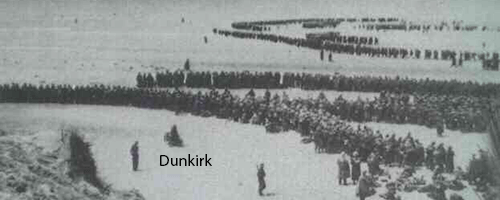In AMERICAN STORY I credit David McCullough’s book John Adams with triggering my exploration into history (and about American history, this was true), but some years before that I picked up William Manchester’s book on Winston Churchill’s life: “The Last Lion.” By the time I finished reading the introduction (quoted below) I was hooked and thousands of pages later still reading. I bought and read, too, his books A World Lit Only By Fire and Good-bye Darkness.
“The French had collapsed. The Dutch had been overwhelmed. The Belgians had surrendered. The British army, trapped, fought free and fell back toward the Channel ports, converging on a fishing town whose name was then spelled Dunkerque.
It was England’s greatest crisis since the Norman conquest, vaster than those precipitated by Philip II’s Spanish Armada, Louis XIV’s triumphant armies, or Napoleon’s invasion barges massed at Boulogne. This time Britain stood alone. If the Germans crossed the Channel and established uncontested beachheads, all would be lost, for it is a peculiarity of England’s island that its southern weald is indefensible against disciplined troops. Now the 220,000 Tommies at Dunkirk, Britain’s only hope, seemed doomed. On the Flanders beaches they stood around in angular, existential attitudes, like dim purgatorial souls awaiting disposition. There appeared to be no way to bring more than a handful of them home. The Royal Navy’s vessels were inadequate. King George VI has been told that they would be lucky to save 17,000. The House of Commons was warned to prepare for “hard and heavy tidings.”
Then, from the streams and estuaries of Kent and Dover, a strange fleet appeared: trawlers and tugs, scows and fishing sloops, lifeboats and pleasure craft, smacks and coasters; the island ferry Grade Fields; Tom Sopwith’s America’s Cup challenger Endeavor; even the London fire brigade’s fire-float Massey Shaw — all of them manned by civilian volunteers:
English fathers, sailing to rescue England’s exhausted, bleeding sons.
Even today what followed seems miraculous. Not only were Britain’s soldiers delivered; so were French support troops: a total of 338,682 men. But wars are not won by fleeing from the enemy. And British morale was still unequal to the imminent challenge. These were the same people who, less than a year earlier, had rejoiced in the fake peace bought by the betrayal of Czechoslovakia at Munich. Most of their leaders and most of the press remained craven.
It had been over a thousand years since Alfred the Great had made himself and his countrymen one and sent them into battle transformed. Now in this new exigency, confronted by the mightiest conqueror Europe had ever known, England looked for another Alfred, a figure cast in a mold which, by the time of the Dunkirk deliverance, seemed to have been forever lost.
England’s new leader, were he to prevail, would have to stand for everything England’s decent, civilized Establishment had rejected. They viewed Adolf Hitler as the product of complex social and historical forces. Their successor would have to be a passionate Manichean who saw the world as a medieval struggle to the death between the powers of good and the powers of evil, who held that individuals are responsible for their actions and that the German dictator was therefore wicked. A believer in martial glory was required, one who saw splendor in the ancient parades of victorious legions through Persepolis and could rally the nation to brave the coming German fury.
An embodiment of fading Victorian standards was wanted: a tribune for honor, loyalty, duty, and the supreme virtue of action; one who would never compromise with iniquity, who could create a sublime mood and thus give men heroic visions of what they were and might become. Like Adolf Hitler he would have to be a leader of intuitive genius, a born demagogue in the original sense of the word, a believer in the supremacy of his race and his national destiny, an artist who knew how to gather the blazing light of history into his prism and then distort it to his ends, an embodiment of inflexible resolution who could impose his will and his imagination on his people — a great tragedian who understood the appeal of martyrdom and could tell his followers the worst, hurling it to them like great hunks of bleeding meat, persuading them that the year of Dunkirk would be one in which it was “equally good to live or to die” — who could if necessary be just as cruel, just as cunning, and just as ruthless as Hitler but who could win victories without enslaving populations, or preaching supernaturalism, or foisting off myths of his infallibility, or destroying, or even warping, the libertarian institutions he had sworn to preserve.
Such a man, if he existed, would be England’s last chance.
In London there was such a man.
Available from:  |







